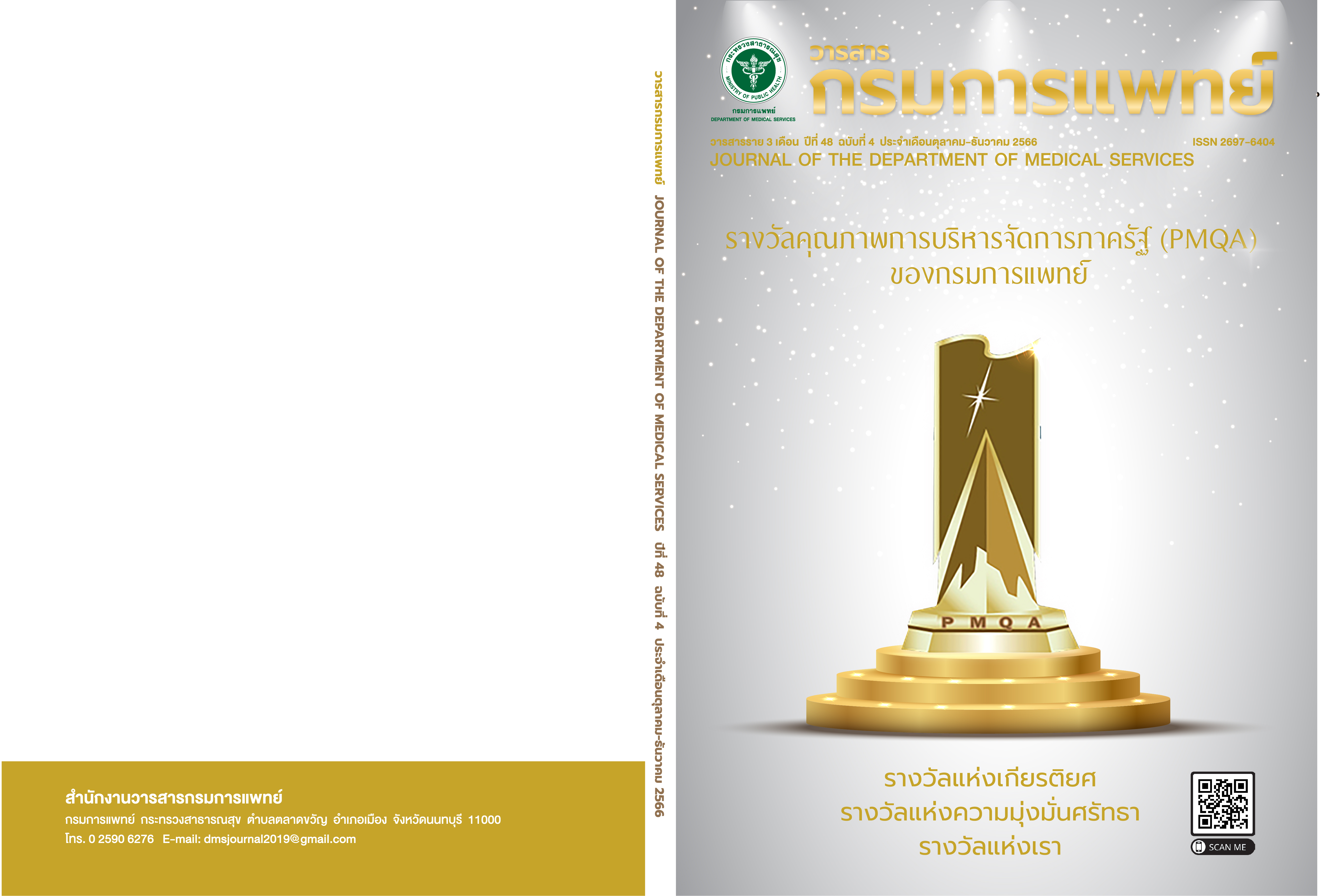ประสิทธิผลของการฟื้นฟูผู้ป่วยโรคหลอดเลือดสมองที่มีภาวะกลืนลำบากโดยทีมสหสาขาวิชาชีพ: การศึกษาแบบย้อนหลัง
คำสำคัญ:
ภาวะกลืนลำบาก, โรคหลอดเลือดสมอง, การฟื้นฟูโดยทีมสหสาขาวิชาชีพบทคัดย่อ
ภูมิหลัง: ภาวะกลืนลำบากนับเป็นหนึ่งในภาวะที่มีความสำคัญและพบได้บ่อยในผู้ป่วยโรคหลอดเลือดสมอง การศึกษาที่ผ่านมาพบว่าแนวทางการฟื้นฟูภาวะกลืนลำบากโดยทีมสหสาขาวิชาชีพ ช่วยเพิ่มประสิทธิภาพในการฟื้นฟูผู้ป่วยที่มีภาวะกลืนลำบากแต่ทั้งนี้ยังมีความแตกต่างของแนวทางในการฟื้นฟู รวมถึงบุคลากรที่เข้ามามีส่วนร่วมในทีมสหสาขาวิชาชีพ วัตถุประสงค์: เพื่อศึกษาผลของการฟื้นฟูภาวะกลืนลำบากโดยทีมสหสาขาวิชาชีพโรงพยาบาลสกลนครต่อระดับความสามารถในการรับประทานอาหารและการเกิดปอดติดเชื้อของผู้ป่วยโรคหลอดเลือดสมอง วิธีการ: เป็นการวิจัยแบบการศึกษาแบบย้อนหลัง ทำการศึกษาข้อมูลจากเวชระเบียนของผู้ป่วยโรคหลอดเลือดสมองที่เข้ารับการรักษาที่หอผู้ป่วยใน โรงพยาบาลสกลนคร ที่มีภาวะกลืนลำบากตั้งแต่วันที่ 1 มกราคม 2563 – 31 ธันวาคม 2565 วัดผลโดยใช้ Functional Oral Intake Scale(FOIS) ผล: ผู้เข้าร่วมวิจัย 70 ราย มีเลือดออกในสมอง ร้อยละ 52.9 อายุเฉลี่ย 58.8 ปี มีคะแนน FOIS แรกรับ, เดือนที่ 1, เดือนที่ 3 และเดือนที่ 6 เป็น 1.6, 4.9, 5.4 และ 5.5 ตามลำดับ และพบว่ามีความแตกต่างอย่างมีนัยสำคัญทางสถิติ (p < .05) การศึกษานี้ พบว่ามีภาวะปอดติดเชื้อ ขณะนอนโรงพยาบาลร้อยละ 20 และภาวะปอดติดเชื้อในเดือนที่ 1, 3 และ 6 เป็นร้อยละ 0, 1.4 และ 2.9 ตามลำดับ สรุป: การศึกษานี้พบว่าการฟื้นฟูผู้ป่วยโรคหลอดเลือดสมองที่มีภาวะกลืนลำบากโดยทีมสหสาขาวิชาชีพทำให้เพิ่มระดับคะแนน FOIS ของผู้ป่วยหลังการฟื้นฟู 1 เดือน 3 เดือนและ 6 เดือน ได้อย่างมีนัยสำคัญทางสถิติ
References
Tiamkao S, Ienghong K, Cheung LW, Celebi I, Suzuki T, Apiratwarakul K. Stroke incidence, rate of Thrombolytic therapy, mortality in Thailand from 2009 to 2021. Open Access Maced J Med Sci 2022;10(E):110-5.
Banda KJ, Chu H, Kang XL, Liu D, Pien LC, Jen HJ, et al. Prevalence of dysphagia and risk of pneumonia and mortality in acute stroke patients: a meta-analysis BMC Geriatr 2022;22(1):420.
Terré R, Mearin F. Oropharyngeal dysphagia after the acute phase of stroke: predictors of aspiration. Neurogastroenterol Motil 2006;18(3):200-5.
Heart and Stroke Foundation of Ontario. Management of Dysphagia in Acute Stroke; An Educational Manual for the Dysphagia Screening Professional. Canada: Heart and Stroke Foundation of Canada; 2006.
Cohen DL, Roffe C, Beavan J, Blackett B, Fairfield CA, Hamdy S, et al. Post-stroke dysphagia: A review and design considerations for future trials. Int J Stroke 2016;11(4):399-411.
Singh S, Hamdy S. Dysphagia in stroke patients. Postgrad Med J 2006;82(968):383-91.
Reber E, Gomes F, Dahn IA, Vasiloglou MF, Stanga Z. Management of dehydration in patients suffering swallowing difficulties. J Clin Med 2019;8(11):1923.
Kim DY, Park HS, Park SW, Kim JH. The impact of dysphagia on quality of life in stroke patients. Medicine (Baltimore) 2020;99(34):e21795.
Aoki S, Hosomi N, Hirayama J, Nakamori M, Yoshikawa M, Nezu T, et al. The multidisciplinary swallowing team approach decreases pneumonia onset in acute stroke patients. PLoS ONE 2016;11(5):e0154608
Benjapornlert P, Arayavichanont P, Manimmanakorn N, Wattanapan P. The prevalence of oropharyngeal dysphagia in acute stroke patients at Srinagarind Hospital. J Thai Rehabil Med 2018;28(2):49-53.
Crary MA, Mann GD, Groher ME. Initial psychometric assessment of a functional oral intake scale for dysphagia in stroke patients. Arch Phys Med Rehabil 2005;86(8):1516-20.
Sirindhorn National Medical Rehabilitation Institute. Clinical practice guidelines: Dysphagia. Nonthaburi: Sahamitr printing & publishing company limited; 2019.
Gandolfi M, Smania N, Bisoffi G, Squaquara T, Zuccher P, Mazzucco S. Improving post-stroke dysphagia outcomes through a standardized and multidisciplinary protocol: an exploratory cohort study. Dysphagia 2014;29(6):704-12.
Chiu CC, Lin HF, Lin CH, Chang HT, Hsien HH, Hung KW, et al. Multidisciplinary care after acute care for stroke: a prospective comparison between a multidisciplinary post-acute care group and a standard group matched by propensity score. Int J Environ Res Public Health 2021;18(14):7696.
Starmer HM, Dewan K, Kamal A, Khan A, Maclean J, Randall DR. Building an integrated multidisciplinary swallowing disorder clinic: considerations, challenges, and opportunities. Ann NY Acad Sci 2020;1481(1):11-9.
D’Netto P, Rumbach A, Dunn K, Finch E. Clinical predictors of dysphagia recovery after stroke: a systematic review. Dysphagia 2023;38(1):1-22.
Grossmann I, Rodriguez K, Soni M, Joshi PK, Patel SC, Shreya D, et al. Stroke and pneumonia: mechanisms, risk factors, management, and prevention. Cureus 2021;13(11):e19912.
Galovic M, Leisi N, Muller M, Weber J, Abela E, Kagi G, et al. Lesion location predicts transient and extended risk of aspiration after supratentorial ischemic stroke. Stroke 2013;44(10):2760-7.
Wilmskoetter J, Daniels SK, Miller AJ. Cortical and subcortical control of swallowing - can we use information from lesion locations to improve diagnosis and treatment for patients with stroke?. Am J Speech Lang Pathol 2020;10(29):1030-43.
Downloads
เผยแพร่แล้ว
How to Cite
ฉบับ
บท
License
Copyright (c) 2023 กรมการแพทย์ กระทรวงสาธารณสุข

This work is licensed under a Creative Commons Attribution-NonCommercial-NoDerivatives 4.0 International License.
บทความที่ได้รับการตีพิมพ์เป็นลิขสิทธิ์ของกรมการแพทย์ กระทรวงสาธารณสุข
ข้อความและข้อคิดเห็นต่างๆ เป็นของผู้เขียนบทความ ไม่ใช่ความเห็นของกองบรรณาธิการหรือของวารสารกรมการแพทย์


